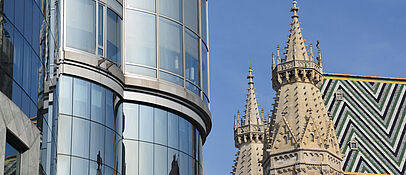The Faculty of Catholic Theology at the University of Vienna sees itself as a place of academic research and study in dialogue with other sciences, with members of the public society and the Church.
The life and work of the faculty is influenced by the "genius loci" of its location Vienna. The history of this city makes Vienna a European focal point of different cultural worlds. Important political policy-makers as well as many international organisations are based in Vienna. Numerous Christian sister-churches, Jewish, Islamic and other religious communities come together in Vienna.
Being a university town, Vienna enjoys the dense presence of various research institutions, as well as other important social and religious institutions.
The geographical neighborhood to Central, Southern and Eastern Europe, especially to the former communist countries, bears a particular challenge for the faculty. That is why we encourage theological interaction with countries in this region.
Together with other faculties of the University of Vienna, the Faculty of Catholic Theology is committed "to reflect on the relationship between politics, power and science critically and self-critically, represent democratic principles internally and externally, advance the human and civil rights and stand up for their realisation, reduce national, religious and cultural barriers and support dialogue between cultures, nations and religions".
-
Theology at the University
Theological science does not operate in isolation, but in close association with the other university sciences. On the one hand, theology requires other sciences for its own work, since it is committed to the standards of modern scientific practice. On the other hand, theology can remind the scientific world that the lives of people are determined not by science alone.
In a context of growing fragmentation of everyday life and technological, social and economic developments, theology demands a culture of freedom and justice for all.
-
Theology and Church
Theology is firmly rooted in tradition that remains its foundation as well as its repsonsibility. In times where "memories" are sometimes despised, a Church that "reminds" can, however, be a powerful shelter for humanity. In carrying out this task, the Church has to rely on the contribution of theology. Theology is integrated in the Church and part of her life; and yet it is subject to the criteria of scientific research.
This can lead to tensions that require a respectful and creative dialogue between Church leadership and theology. A contribution to the time-sensitive self-interpretation of Christianity and the Church can be expected from theology. In addition, theology contributes to the creative advancement of ecclesiastical structures and the ecclesiastical personnel development by providing qualified scientists to offer education and training.
In a time of growing interest for diverse forms of spirituality, the faculty is dedicated to making the importance of academic theology visible. The Christian traditions of spirituality and mysticism are to be connected to the discourse informed by the Enlightenment.
-
Theology and Society
It is the Gospel that binds the Church to the people, their personal lives and social coexistence. Therefore, theology's mission is to unfold the renewing power of the Gospel in a way that is critical, loyal and attentive to current social and cultural developments.
The Faculty of Catholic Theology at the University of Vienna is therefore concerned with socially relevant issues and current challenges. These include, among others, the theodicy issue, the destiny of the culture of freedom, violence in society, solidarity and the culture of solidarity, gender equality, current ethical questions, the aims and formation of school education and inter-religious dialogue.
The faculty does not only work within academic circles, but also makes its projects and results available to the general public. This serves to shape the public's perception of theology's social responsibilty.

